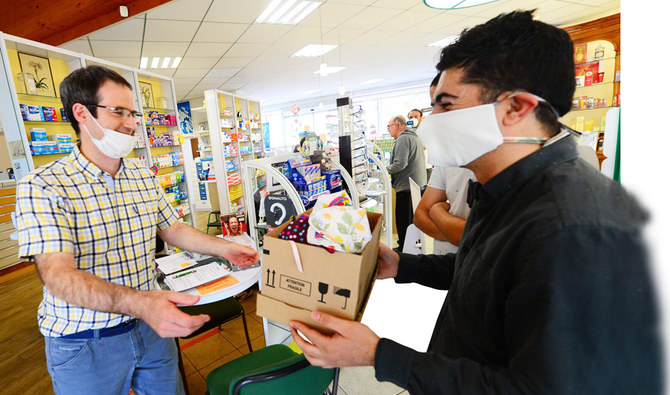LAVARDAC, FRANCE: The lanes of Lavardac, a tiny village in the southwest of France, are largely silent during the nationwide lockdown, but a rhythmic whir can be heard from the upstairs window of one unassuming house.
It is the sound of sewing machines being used to make fabric coronavirus masks for the local population by five Syrian Kurdish refugees.
The Shikho family — brothers Mustapha, Mohamad, Fawzi, Hekmat and their brother-in-law Riad — decided to produce the masks as a show of “solidarity” with their fellow townsfolk and as a gesture of gratitude for allowing them to settle in Lavardac in 2016.
In a narrow room with white walls that serves as a workshop, the family cuts out, sews and folds the colored fabrics.
And dozens of finished handmade masks stand ready on an ironing board to be delivered to the nearby pharmacy.
“We wanted to be of service to the locals who cannot go out. We know what it’s like to stay locked up,” says Mustapha, the oldest. “In our case, it was the war.”
The 31-year-old, who like his brother Mohamad is a tailor by training, had initially planned to open a workshop in Lavardac, a leafy community of just 2,300 souls.
But the nationwide lockdown in France, in force since March 17, changed all that and they decided to work from home.
“We had a pile of fabric. We began by making masks for the family,” says 24-year-old Mohamad.
The town hall helped us. So we wanted to make a gesture for them in return.
Mohamad Shikho, a Syrian refugee
“We said to ourselves: ‘Why not make it for our friends, the inhabitants?’ The town hall helped us. So we wanted to make a gesture for them in return.”
To date, the Shikho brothers — with the occasional help of their sisters and mother Radija — have produced about 2,000 masks, three-ply and washable. And their work has not gone unnoticed.
“Thanks to their masks, people can now venture out again,” says local pharmacist Frederic Barthe.
“The population has some sort of protection. It is a lesser evil, pending the arrival of the real FFP2 (masks) or surgical ones.”
His pharmacy and that of the neighboring town, together with a handful of local associations, try to reimburse the Shikhos €1 ($1.09) for each mask sold to cover costs and equipment. “People tell us we should sell them for €4 to €5, but we don’t want to do that, out of solidarity,” explains Fawzi.
A 19-year-old high school student, Fawzi wrote a booklet, “I’m searching for peace,” depicting the family’s odyssey.
It begins in Homs where they were living when the Syrian conflict began nearly a decade ago.
From there, they moved to Lebanon for a few months, before reaching Afrine, a corner of Syria where they originally came from, but which is now occupied by anti-Kurdish Turkey.
Their journey then took them to Istanbul, Athens and finally France.
“We learned our first word of French at the airport, it was ‘Bonjour,’” laughs 17-year-old Hekmat who now speaks French almost like a native, albeit without the regional accent.
For Lavardec’s mayor, Philippe Barrere, the decision to settle a family of Syrian refugees in the village was not entirely unproblematic.
“There was some resistance within the population,” he says.
But “through school, local associations and work,” the Shikhos “demonstrated their strong desire to integrate and this initiative with the masks is a very good example of their goodwill and their hearts being in the right place.”



























